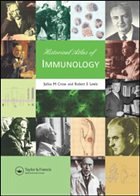Review:
'The succinct nature of the book and the use of two formats separating expository writing and definition entries are positive features. The illustrations add value.' ‘- Doody's Book Review, July 2005’
Table of contents:
1. Origins of Immunity in Antiquity: Rhazes; Variolation, Lady Mary Wortley Montagu; Edward Jenner and Smallpox Vaccination by Cowpox Innoculation 2. Germ Theories of Disease and the Advent of Classical Immunology 3. Immunochemistry 4. The Complement System - Chronology and Mystique 5. Anaphylaxis 6. Atopy, Arthus and Shwartzman Reactions 7. Cellular Immunity and Delayed Hypersensitivity 8. Immunobiology, Cellular Immunology and Tumor Immunity 9. Autoimmunity 10. Immunohematology 11. Immunogenetics, Immunologic Tolerance, and Transplantation 12. Immunization Against Infectious Diseases; Interferon; Congenital Immunodeficiencies; AIDS 13. Immunological Methods 14. Immunological Societies 15. Landmarks in the History of Immunology
Written by the best-selling author and official historian of the American Society of Immunologists and, this comprehensive atlas depicts major people and events related to milestones in the field of immunology. From the origins of immunological study through the critical events that have shaped the field into what it is today, this vital collection of immunological data intersects all aspects of biomedical science. In addition to containing over four hundred photographs and illustrations, it details the ways in which immunology has developed key concepts, theories, approaches and procedures that have affected the fields of molecular biology, and biochemistry.
‘Historical Atlas of Immunology:’
- Contains collection of rare conceptual immunology images and illustrations
- Provides historical ranges from antiquity to the twenty-first century
- Presents a time-line of the influences that led to the emergence of immunology as a medical and biotechnology establishment.
This comprehensive atlas depicts key historical figures and important events related to milestones in the field of immunology. From the origins of immunological study, through to the critical events that have shaped the field into what it is today, this vital collection of immunological data intersects all aspects of biomedical science. In addition to containing over four hundred color and black and white photographs and illustrations, the text details the ways in which immunology has developed key concepts, theories, approaches, and procedures that have affected the fields of molecular biology and biochemistry.’ ‘
Depicting historical figures and important events related to milestones in the field of immunology, this extensive atlas provides a vital collection of immunological data that intersects all aspects of biomedical science.
'The succinct nature of the book and the use of two formats separating expository writing and definition entries are positive features. The illustrations add value.' ‘- Doody's Book Review, July 2005’
Table of contents:
1. Origins of Immunity in Antiquity: Rhazes; Variolation, Lady Mary Wortley Montagu; Edward Jenner and Smallpox Vaccination by Cowpox Innoculation 2. Germ Theories of Disease and the Advent of Classical Immunology 3. Immunochemistry 4. The Complement System - Chronology and Mystique 5. Anaphylaxis 6. Atopy, Arthus and Shwartzman Reactions 7. Cellular Immunity and Delayed Hypersensitivity 8. Immunobiology, Cellular Immunology and Tumor Immunity 9. Autoimmunity 10. Immunohematology 11. Immunogenetics, Immunologic Tolerance, and Transplantation 12. Immunization Against Infectious Diseases; Interferon; Congenital Immunodeficiencies; AIDS 13. Immunological Methods 14. Immunological Societies 15. Landmarks in the History of Immunology
Written by the best-selling author and official historian of the American Society of Immunologists and, this comprehensive atlas depicts major people and events related to milestones in the field of immunology. From the origins of immunological study through the critical events that have shaped the field into what it is today, this vital collection of immunological data intersects all aspects of biomedical science. In addition to containing over four hundred photographs and illustrations, it details the ways in which immunology has developed key concepts, theories, approaches and procedures that have affected the fields of molecular biology, and biochemistry.
‘Historical Atlas of Immunology:’
- Contains collection of rare conceptual immunology images and illustrations
- Provides historical ranges from antiquity to the twenty-first century
- Presents a time-line of the influences that led to the emergence of immunology as a medical and biotechnology establishment.
This comprehensive atlas depicts key historical figures and important events related to milestones in the field of immunology. From the origins of immunological study, through to the critical events that have shaped the field into what it is today, this vital collection of immunological data intersects all aspects of biomedical science. In addition to containing over four hundred color and black and white photographs and illustrations, the text details the ways in which immunology has developed key concepts, theories, approaches, and procedures that have affected the fields of molecular biology and biochemistry.’ ‘
Depicting historical figures and important events related to milestones in the field of immunology, this extensive atlas provides a vital collection of immunological data that intersects all aspects of biomedical science.

